This week, Luka and I debate Alicent’s motivations, Daemon’s unpredictability and whether or not Criston Cole deserves our hate.
*Fair warning* We avoid explicit Fire and Blood spoilers but tease them often and openly reference future events shown in the trailers.
Petra: We’ve made it to the midpoint.
Luka: Yeah, the last episode of this more or less continuous timeline, which made it feel like mid-season finale, which is new for Game of Thrones. Was it to your liking?
Petra: I thought it was a solid set up for what’s to come. Everyone’s locked in place on their respective sides and we more or less know why they dislike each other now.
Luka: I’m trying to think what the show would look like if it started after the time jump, and I just can’t see it. Then again, I also can’t see these five episodes stretched to double their length for a whole season with the young cast, as some people have clamored for. So, yes, I thought it was a great final episode for this first stage of House of the Dragon, setting up what’s to come. At this point the sides are more or less clear, except for a few outliers, like Daemon.
Petra: I’m unclear on where Daemon stands at this point, as in, I don’t know what he wants. I get that he’s an agent of chaos but I still feel that, halfway through the season, we should have a firmer grasp on his character than we do.
Luka: The funny thing is I feel the opposite but for the same reason. I think they’re keeping him unpredictable on purpose, so we know exactly as much as we should about where he stands. One interpretation is that he’s doing whatever he can to cling to any semblance of power and status: trying to claim Runestone, of all places; flirting with Laena. How is it that Fire and Blood puts it? “Men of a more cynical bent believe the prince [was looking for] a way to check his own descent.” Personally, I don’t believe he has any grand plan or strategy for taking power, but I do feel like he’s, basically, grasping at anything that could “check his own descent,” both in status and in his family.
Petra: Something about Daemon that I’m finding interesting, as it relates to Rhaenyra, is his imperviousness to consequences. He gets banished, kills his wife, then returns home and cashes in on his inheritance. I think that’s something Rhaenyra envies, as “We Light the Way” is largely about Rhaenyra facing the consequences of her actions.
Luka: Speaking of Rhaenyra, as far as I’m concerned we got our wish concerning her arrangement with Laenor, didn’t we? Sure, it ended in tragedy for both and currently neither of them has the paramour they expected, as one’s dead and the other… estranged, to say the least. But still! That was nice to see, right?
Petra: Yes! We’d both expressed hope that Rhaenyra and Laenor would have a frank discussion about their marriage, and they did! Going by the clip that was released from next episode, they develop a close, mutually respectful and supportive relationship, which is a real standout in this world.
Luka: Another thing that clip teases is just how bad things get between Rhaenyra and Alicent, and in “We Light the Way” we see how that starts. What a standout week for Alicent! When we first got the episode titles, I was confused by the fact that the episode centering on Rhaenyra and Laenor’s wedding was titled with the Hightower house words. But after watching it, that title couldn’t make more sense. In a way, we’ve just seen her origin story. I think it’s fair to say she’s the character who’s evolved the most these first five episodes, followed by Rhaenyra.
Petra: I’d agree. It’s been interesting to see how many different ways fans interpret her turn against Rhaenyra this episode. I mean, objectively, her breaking point is the realization that Rhaenyra lied to her, but there’s some ambiguity as to why. What’s your take?
Luka: Not unlike with Criston’s motivations at the end, I think it’s complicated. I believe for Alicent it’s about feeling betrayed by her once-best friend with whom she’d just made up. But it’s also about faith and honor and, crucially, about realizing (in her eyes) that her father was right. As she sees it, if Rhaenyra can lie about something like that, on her own mother’s memory, and she can act in such a “dishonorable” way, is it so unthinkable that she might do away with Alicent’s children? She had to make a choice and chose to semi-publicly declare her stance on her step-daughter’s claim while aligning herself with the family of her birth for the first time in many years. And she did it with a dress that’s not only a veiled declaration of war but perhaps also a moralizing reminder for Rhaenyra: “We light the way.” In her view, Rhaenyra has strayed from “the way,” and Alicent has spent two episodes trying to guide her. But what has she gotten for her efforts? Her father fired and herself duped by who she believed to be her only friend. To be clear, this isn’t how I see it; but I feel like that’s how Alicent experienced it.
Petra: To me, the more compelling interpretation is that Alicent’s turn has more to do with Rhaenyra’s lie than her sexual immorality. Quite a few times now we’ve seen Rhaenyra disregard other people’s feelings in order to do what she wants. She talks to Sam the bard like he’s a Spotify app, she tells Daemon “[the Smallfolk’s] wants are of no consequence,” and she’s a rude guest at Storm’s End. I think she views most of the relationships in her life in “I – it” terms, rather than “I – thou.” We see this tendency again in “King of the Narrow Sea” where she fails to have sex with her uncle, as she wants to, so she has sex with her sworn protector instead, and then lies about it to protect herself. I think for Alicent (and Criston, but we’ll get to him later) the lie is what breaks the camel’s back because it makes her realize that Rhaenyra sees their friendship as “I – it” rather than “I – thou.” Whether Rhaenyra actually views Alicent this way in immaterial. It’s Alicent’s perception that matters.
Luka: Criston’s revelation is kind of a double punch in the gut for Alicent. Not only did Rhaenyra lie to her (at least by omission, that she knows; though she also lied that Daemon “didn’t touch her,”) but the truth was worse than she could have imagined. What she was expecting to discover here was that Daemon basically seduced her, which is bad enough in her view. Instead she learns she had sex with her celibate sworn protector “at her instigation.” I do believe there’s an underlying element of jealousy as well, though I don’t think it’s something Alicent is conscious of. She got married off without having a say in the matter and is habitually maritally raped by a man twice her age who’s falling apart. Rhaenyra, in turn, got the opportunity to marry whomever she liked, squandered it, only to then get involved with her uncle and then her bodyguard, who swore an oath of celibacy. On some level, I believe part of her is thinking, “How can she get away with this? How can she get a marriage of convenience after everything she’s done, one that’ll allow her to continue doing whatever she wants while I have to remain dutiful?”
Petra: I agree. Jealousy absolutely informs Alicent’s feelings about Rhaenyra’s actions. However, I think it’ll be a missed opportunity if, after the time jump, her issues with Rhaenyra are completely tied up in sexual immorality. It would reduce the Greens to Team Slut-Shame, overtly framing the Blacks as the side we, the audience, are intended to root for.
Luka: I’d argue that assumes what “the audience” is rooting for. If the audience is you and I, sure, but I suspect there are plenty of more conservative people watching the show who’d align themselves with the Green position without ever having an “are we the baddies?” moment of realization. That said, I believe that sexual immorality will only be the “party line” for the Greens, if you will. That’s what it was in Fire and Blood. It was the political weapon with which they attacked Rhaenyra, but sheer greed will be the true motivation for many of the Greens, such as Ser Otto and Lord Hobert, and Alicent will have her own personal reasons. Alicent may use Rhaenyra’s sexual immorality to smear her reputation, but whatever she says we all know that’s not the whole story. It’s part of it, but she also feels so betrayed by Rhaenyra that she can’t ever trust her again. It’s jealousy, betrayal, anger, and also sheer self-defense for her at this point as well, as she now believes what her father told her about Rhaenyra having to kill Alicent’s children to take the throne.
Petra: I remember Miguel Sapochnik likening Rhaenyra to punk rock and Alicent to Women for Trump in that Empire Magazine feature. I didn’t get any sense of that in Alicent’s characterization for the first four episodes but if, moving forward, virtue and sexual purity dominate her motivation, I suppose that’ll be a fair description of her. It’ll be unfortunate, though, since she was so nuanced and sympathetic in the beginning. The idea that Alicent believes that Rhaenyra will kill her children once she learns she had pre-marital sex and lied about it because, well, “she’s unvirtuous, so she’s capable of anything,” frames Alicent as … well, far from the intelligent, discerning young woman we’ve gotten to know.
Luka: I don’t think losing sympathy with the audience means that she has to be any less nuanced. She can remain a complex character that glues us to the screen while being a pretty detestable person doing detestable things, in my view. I don’t think she’s losing dimensions or becoming less intelligent and discerning just because she has medieval notions of virtue like almost everyone else in this world. We’re not gonna root for her as some of us may have so far, though, I’ll grant you that.
Petra: Fair point. I guess I meant in the way the show frames her. Game of Thrones had fantastic characters whom we weren’t meant to agree with. I liked the idea of presenting the Greens and Blacks as two sides with equally strong standpoints. I know that’s not how Fire and Blood presents them, but I was hopeful that would be an adaptational change.
Luka: See, that’s another place where we agree and disagree at the same time. I do believe House of the Dragon is striving to present the two sides with equally strong standpoints… but in a subverted Martin-like manner. What we’re being shown, as I see it, is that both sides are problematic at the root of their motivations and actions. As you said earlier, Rhaenyra being rude to everyone, not making friends, and not being careful about her indiscretions is a terrible way to shore up support for her own claim. To put it plainly: it’s arrogant. I still root for her, but she’s made pretty terrible decisions so far and, as we both know (alongside anyone who’s watched the trailer for next episode,) in the next ten years she’ll have made three even more public mistakes and expect no one to make a fuss simply because she is the heir and that’s that. So, despite the self-righteous moralizing we can expect from Alicent and the Greens, I believe the show has perfectly set up that they do have a point, of sorts—or, at least, that Rhaenyra could’ve easily avoided giving them so much ammunition.
Petra: I like that angle, and I definitely think we’re going to see the consequences of her visit to Storm’s End this season. The show has fleshed out the Green characters really well so far, and, you’re right that nuanced doesn’t mean we approve of their actions. Case in point, Criston turned a man’s head into hamburger this episode.
Luka: That was rough. I’ve seen a lot of people questioning two things here: Ser Criston’s motivations and the apparent lack of consequences for his actions. I personally felt the episode was as explicit as it gets with the former, and gave us enough to piece it all together for the latter. How did you feel about it, from a storytelling perspective?
Petra: I think his motivation is quite clear, and the debate mostly pertains to how sympathetic people find it. He regrets breaking his vow, and everything he does in this episode is in reaction to that regret. Whether beating Joffrey into minced pie filling was out of fear of blackmail or just blind rage is, I suppose, up to interpretation, but the point is: he feels his life is over because he boinked the princess. And, to be honest, I still do not hate him. Yes, he’s blaming her for his bad decision-making, but I also think he feels used.
Luka: I do hate him a bit, to be honest, but I also get his motivation. It helps that he wasn’t being sane or rational, and he wasn’t planning to get out of that one alive. Which brings me to the other thing: do you need an explicit explanation for how he remains a Kingsguard after that debacle? I ask this taking into consideration that next episode we’re jumping ten years in the future, so I doubt we’ll get more than a passing reference to what may have happened, at most.
Petra: A passing reference is enough for me. Alicent pardoned him. and she’s the queen so that’s that. It was an odd choice to make Joffrey’s death such an obvious murder, whereas in Fire and Blood he dies in a melee, but from a dramatic standpoint I see why they chose the pre-wedding feast. Westeros weddings have their quota, you know?
Luka: See, here’s the thing, I don’t think it was as obvious a murder as some people are making it out to be. Make no mistake: it was murder. And it was obvious to us, who’d been watching Ser Criston unravel for the entire episode. But was it obvious to everyone in attendance? It may not matter, if Alicent pleads for his life, but I do believe there’s some plausible deniability there. And I think it was filmed as such, on purpose. We see it from Viserys’s perspective at first, and he can’t see what’s going on. Who started the fight? Why? How? One of the possibile instigators is a sworn brother of the Kingsguard, defended by the queen (and, for now, still probably by the princess too). The other is a dead knight. The companion of the king consort-to-be, sure, but I don’t think it’s in Laenor’s best interest to defend his memory too publicly, for obvious reasons. We don’t see anyone notice how the fight starts; but we do see people notice Joffrey pulling out a knife. It’s the classic cop defense, isn’t it? “He was reaching for a weapon.” I genuinely believe he could claim Joffrey pulled the knife in order to kill Criston or Rhaenyra or whomever, and that Criston was “forced to” kill him in order to stop him. It’s pure nonsense, of course, but that’s what I assumed would happen; that’s why I thought we were shown the ambiguity of how the fight started and Joffrey pulling out the knife. For me, that and the end, with Alicent saving his life, is enough of an explanation for me. I get it if you want something more explicit next episode, though. We’ll see.
Petra: I haven’t rewatched that scene, for understandable reasons, so I think I missed that Joffrey pulled a knife. Given what little pretense is required for bloodshed in Westeros, as we saw at the tourney in “Heirs of the Dragon” and the duel between Blackwood and Bracken in “King of the Narrow Sea,” I’d say Criston will find some way to evade justice. Life is very cheap in Westeros right now. And it’s about to get cheaper.
Luka: Indeed! I enjoyed witnessing the tension and the allegiances build over the last five episodes, and I loved Milly Alcock and Emily Carey as the younger Rhaenyra and Alicent, but I’m so excited to move forward to the “meat” of the story. What are you looking forward to the most next episode, which is titled “The Princess and the Queen”?
Petra: I’m excited to see Aemond. Going by the preview, it’s going to be a … big episode for him.
Luka: I don’t think we’re quite there yet, if you’re talking about what I think you’re talking about, but I’m also looking forward to meeting the young characters of the Dance of the Dragons. Unlike with the adults, none of them will be played by their final actors yet, but I’m still excited. Aegon, Helaena, Aemond, Jace, Luke. It’ll be fun. Of course, I can’t wait to see what Emma D’Arcy and Olivia Cooke do with Rhaenyra and Alicent; from the trailers and the brief clips of next episode that have been released, I couldn’t be more pumped.
Petra: We’ve had a lot of build up so far, and I’m ready to see it start paying off. The dominos are going to start falling.
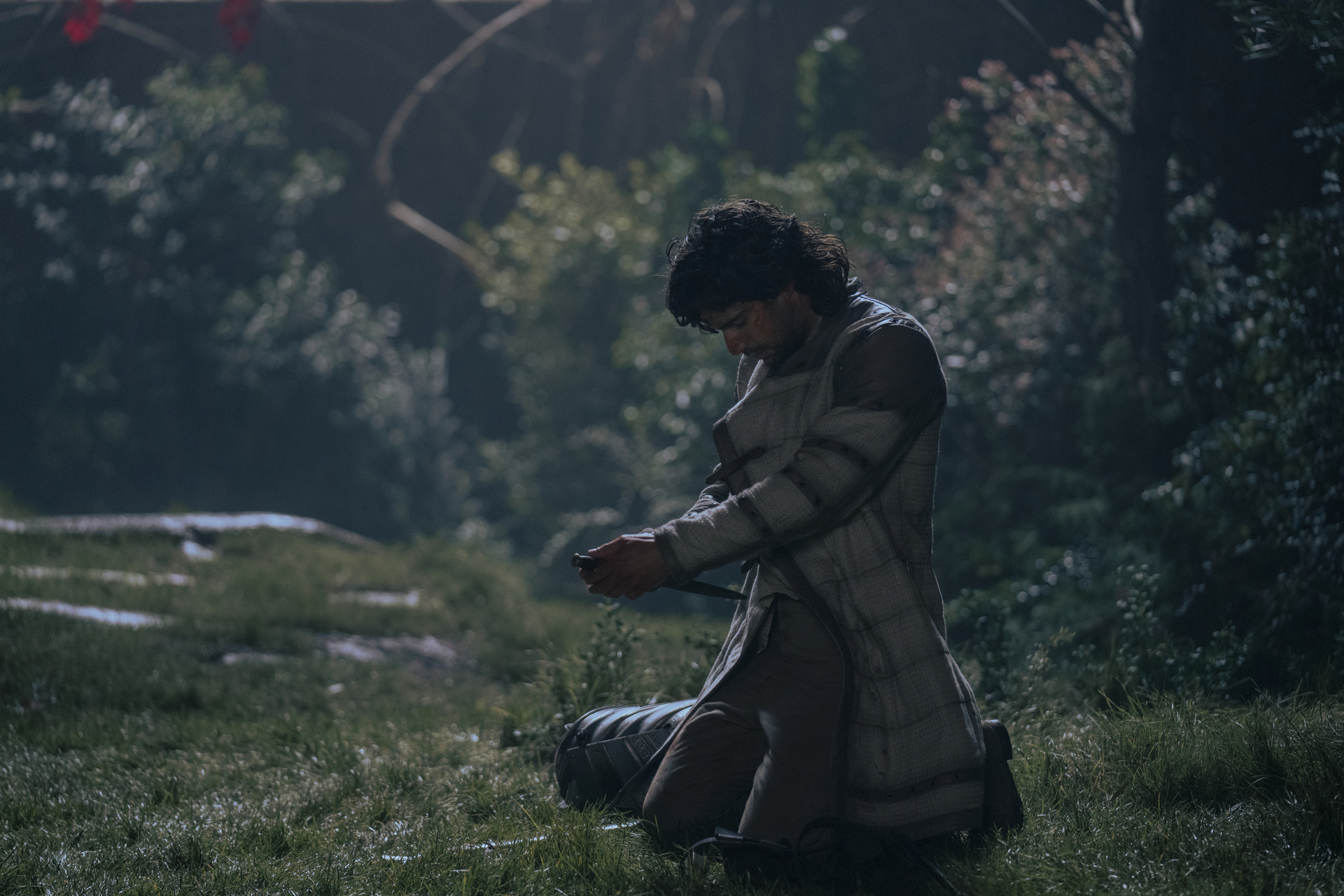
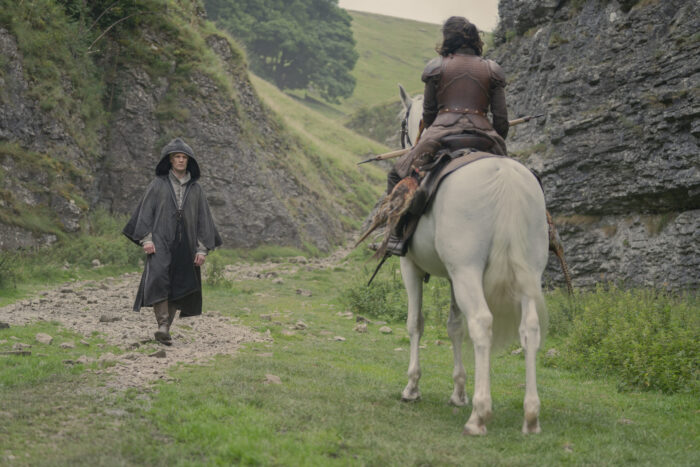
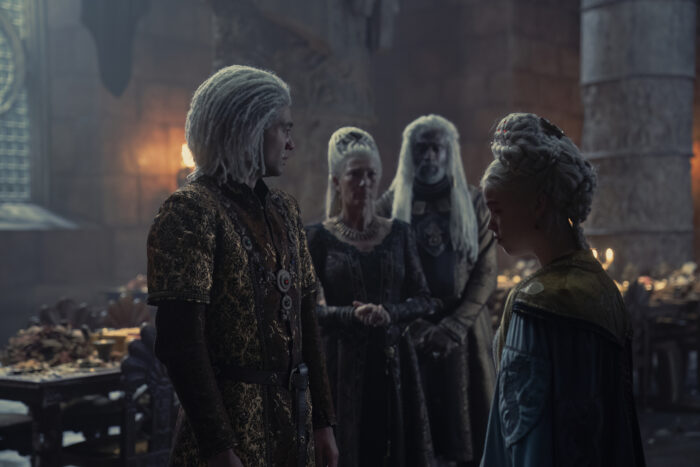
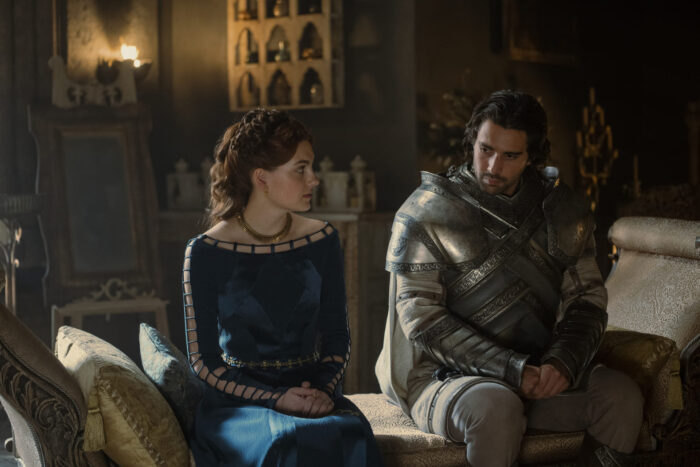
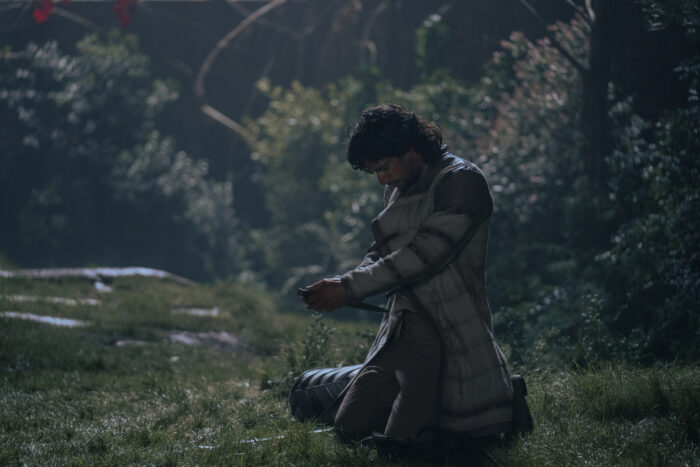
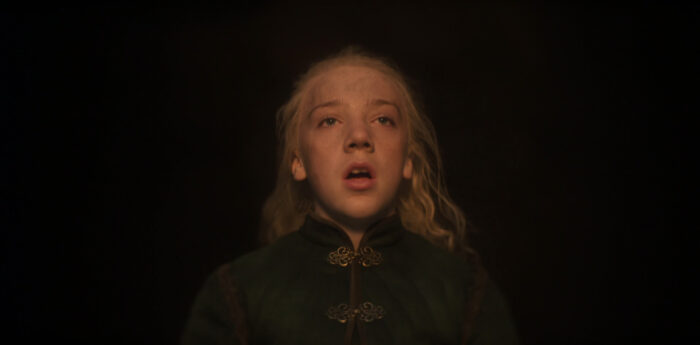
Thanks for the great discussion, Petra and Luka.
I believed after the first watching of the scene, and even more so after rewatching several times, that Joffrey went back to taunt Criston some more and got his faced smashed for his efforts.
If you watch closely, Joffrey makes his “cunt-struck” comment to Laenor, Laenor goes to dance with Rhaenyra, and Joffrey makes his way to Criston, who is across the room. Joffrey oozes his nonsense into Criston’s disgusted ear, then pats Criston on his bottom and slithers away. He gives Laenor a little head cuddle as Laenor comes off the dance floor. Criston and Joffrey are again on opposites sides of the room. So how did Joffrey end up beaten to a pulp?
Criston wouldn’t think of following Joffrey to make trouble. That’s not his nature, not yet. Joffrey must have been so pleased with himself, so smug, he decided to wring some more pleasure from Criston’s distress. To me, that has to be the only reason the two were anywhere near each other. Who knows what further nastiness Joffrey whispered? But, he must have been the one who went back near Criston, and he got himself minced because of it.
We Light the Way is Episode 5. Says Episode 4 in the title
Just a note